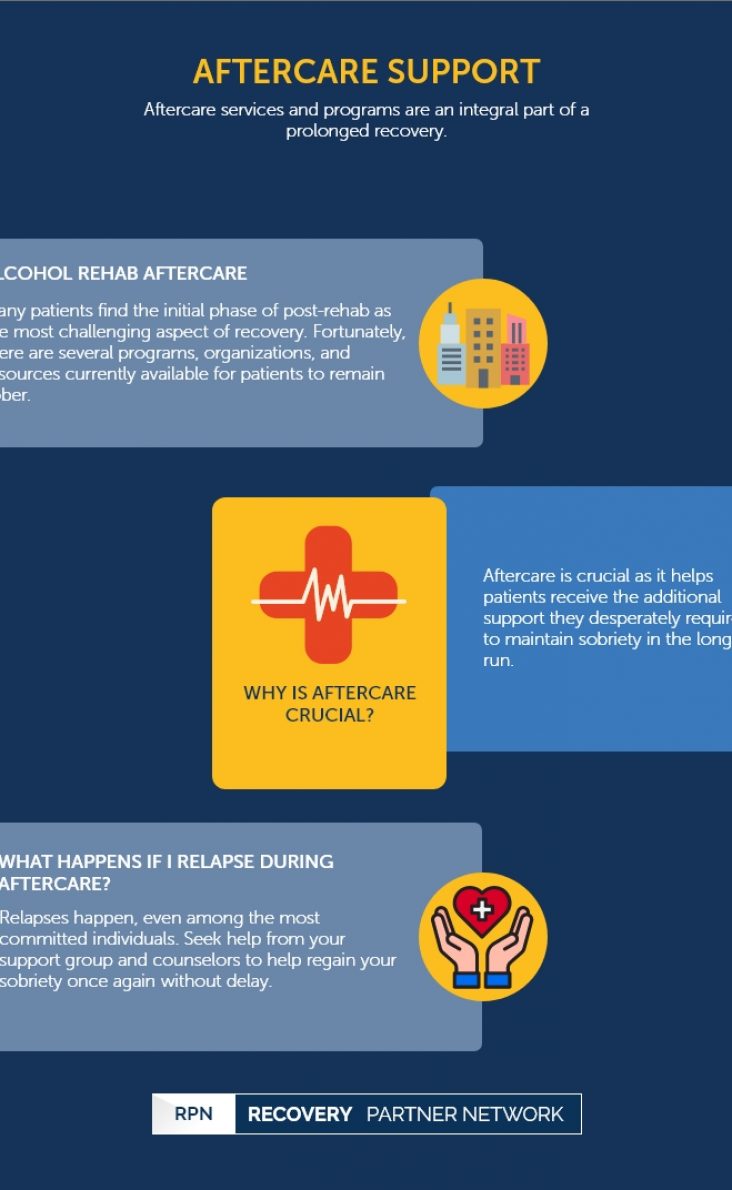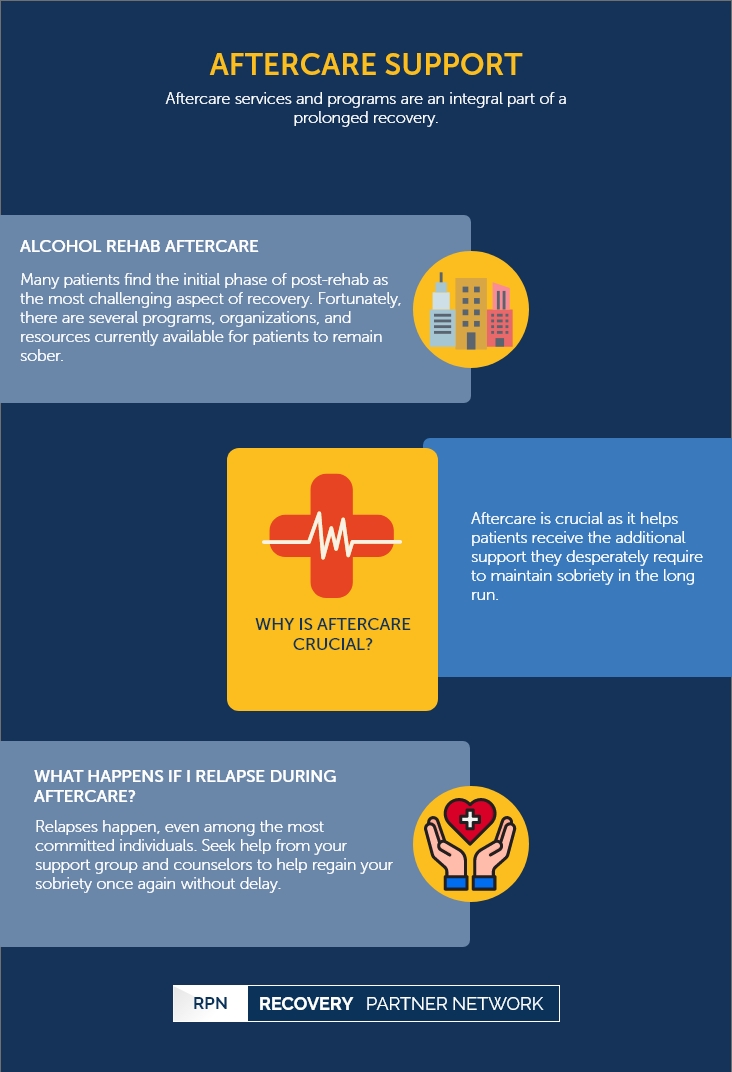Aftercare services and programs are an integral part of a prolonged recovery.
Aftercare Support
Aftercare Support | Table of Contents
Rehab Aftercare
Although enrolling in a rehab facility is a significant step on the road to recovery, it is not the only step required to maintain and prolong one’s sobriety. The 30-to-90-days spent by most patients in a rehab center is only a brief period relative to the time spent battling this disease. Addiction is a chronic relapsing disease that lasts a lifetime. Many patients find the initial phase of post-rehab as the most challenging aspect of recovery, particularly with the absence of a routine and the re-emergence of external influences.
Fortunately, there are several programs, organizations, and resources currently available for patients to remain sober. There are also several relapse prevention techniques a patient can use to help manage cravings and triggers.
FAQ
- What are aftercare programs?
- What are the services provided by aftercare programs?
- Why is aftercare programs important?
Aftercare programs consist of follow up treatments after the completion of rehab programs.
Aftercare programs help patients’ transition from a life of rehab to a life of independence so they could be productive members of society. This program provides patients with services such as counseling, group therapy, relapse prevention education, and nutrition planning.
Aftercare programs provide recovering patients with a feeling of closeness, intimacy, and a sense of community while also reducing the chances of a relapse. It gives patients the opportunity to continue with treatment while addressing life complications that may arise after leaving rehab.
Aftercare Programs and Organizations
Most recovery centers run their own aftercare services. The nature of these services differs greatly. Examples of aftercare programs offered by certain recovery centers include sober-living plans, follow-up counseling, medical examinations, and alumni support groups.
A sober living home is a residential facility for patients recovering from substance addiction. Some of these facilities are associated with recovery centers and government agencies, while others are operated independently. Sober living homes are found throughout the United States but are more prominent on the West Coast, especially in California. According to several reports, these facilities have been found to improve the probability of a prolonged recovery. Although most sober living homes are built for temporary residence lasting less than one year, others provide long-term alternatives. Although every sober home works under a particular set of rules, most have certain features in common, including a commitment from all occupants to stay sober, strict policies and curfews, and shared living expenses. Many sober living facilities enforce a stricter set of guidelines for new members, which gradually lessen over time.
Therapy and counseling appointments conducted regularly at inpatient centers are often the most important aspect of the recovery process. These services help patients address their psychological dependence on alcohol while also treating underlying issues and co-occurring disorders. Newly sober patients are usually recommended to attend weekly meetings, which progressively reduce to bi-weekly and monthly meetings as their sobriety stabilizes. Therapy and counseling are extremely important for patients with a dual diagnosis.
Some of the most common therapies for alcoholism include:
- Dialectical Behavior Therapy
- Experiential Therapy
- Faith-Based Drug Rehab
- Biofeedback Therapy
- Cognitive Behavioral Therapy
- Holistic Therapy
- Motivational Enhancement Therapy
It is highly advised that all recovering patients regularly attend support groups, particularly during early sobriety. Support groups are comprised of communities of recovering patients and families of substance abuse. These gatherings provide a safe and supportive environment for patients to talk freely, void of all judgments. Support groups are vital as members provide each other the support and guidance they require while also holding each other accountable for their actions.
Support groups such as Alcoholics Anonymous (AA), is by far the most recognized and most widely attended substance abuse organization in the US and around the world. Although most support groups function under a faith-based program, there are supports groups available that follow alternative methods.
Why is Aftercare Crucial?
After the effective completion of inpatient or outpatient treatment programs, patients will find themselves surrounded by temptations and triggers once they are back in the outside world. These negative influences may consist of friends you once abused alcohol with, your favorite bar, or even the stress at home or at work. Although some triggers are easily avoidable or managed, there will be a few that would require some help to get through.
Patients are highly advised to seek and continue with aftercare programs to help them receive the additional support they desperately require to maintain sobriety in the long run. A counselor will help patients recognize triggers and establish methods to prevent them or manage them better. A caseworker or therapist will help patients understand and build alternative approaches to high-risk circumstances, such as being offered alcohol or attending a social event where alcohol is consumed.
Individual Aftercare Steps
Sobriety is not a single action but instead a continual series of acts and choices taken over a patient’s lifetime. Here are several individual aftercare measures to follow during post-rehab:
- Develop a rehabilitation program that includes setting goals and achieving those goals.
- Learn how to understand and cope with negative emotions.
- Find supportive and healthy living methods.
- Organize and establish an everyday living routine and schedule.
- Discover and visit at least two support groups to find the one that best suits you.
- Find and attend a therapist or counselor.
- Build a support system to help manage cravings.
- Include physical activities or exercises daily.
- Maintain regular interactions with support groups (at least once a week or more.)
- Attend therapy or counseling at least once a week.
- Maintain a recovery journal that includes impulses and how you conquered them.
- Visiting a career counselor and discussing professional goals.
- Initiate repairing broken or damaged relationships.
- Develop short- and long-term goals (with a financial planner.)
- Focus on a long-term goal.
- Try out new hobbies.
- Celebrate significant recovery milestones (especially 6-month and 1-year achievements.)
- Help new recovering patients achieve your level.
- Develop five and ten-year plans (professional, personal, and financial.)
- Search for more or new motivational ways to keep your mind occupied.
What Happens if I Relapse During Aftercare?
Addiction is known as a relapsing disease as it holds a high chance of patients undergoing a relapse. Relapses happen, even among the most committed individuals. What is important is to accept it as a challenge and not as a failure. Seek help from your support group and counselors to help you regain your sobriety once again without delay.
Recovery Partner Network
We aim to educate and empower. If you feel our library of resources does not cover your specific need, reach out to us, and we would be happy to help.
STATISTICS
© Copyright 2025


